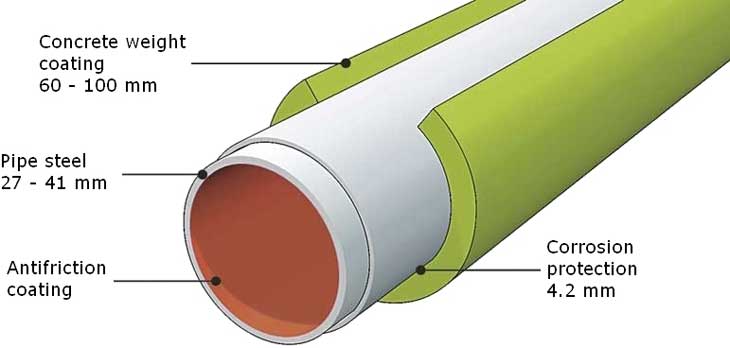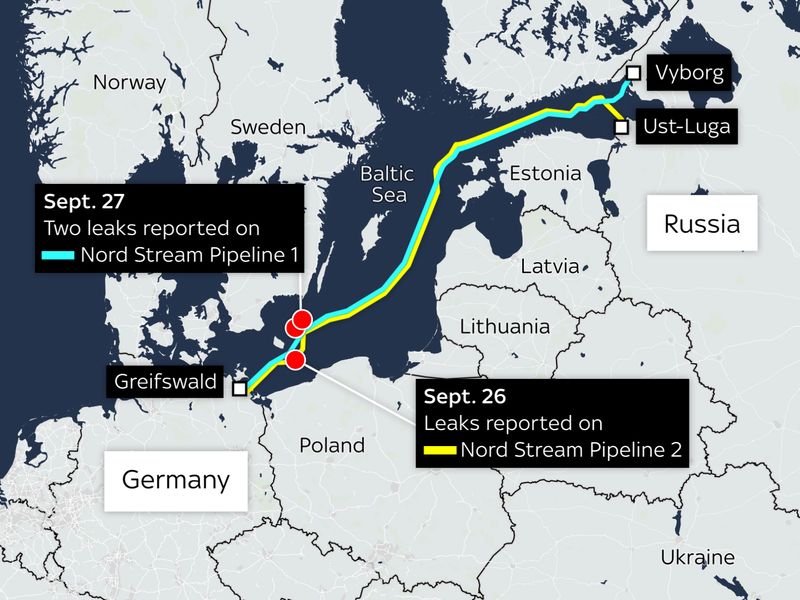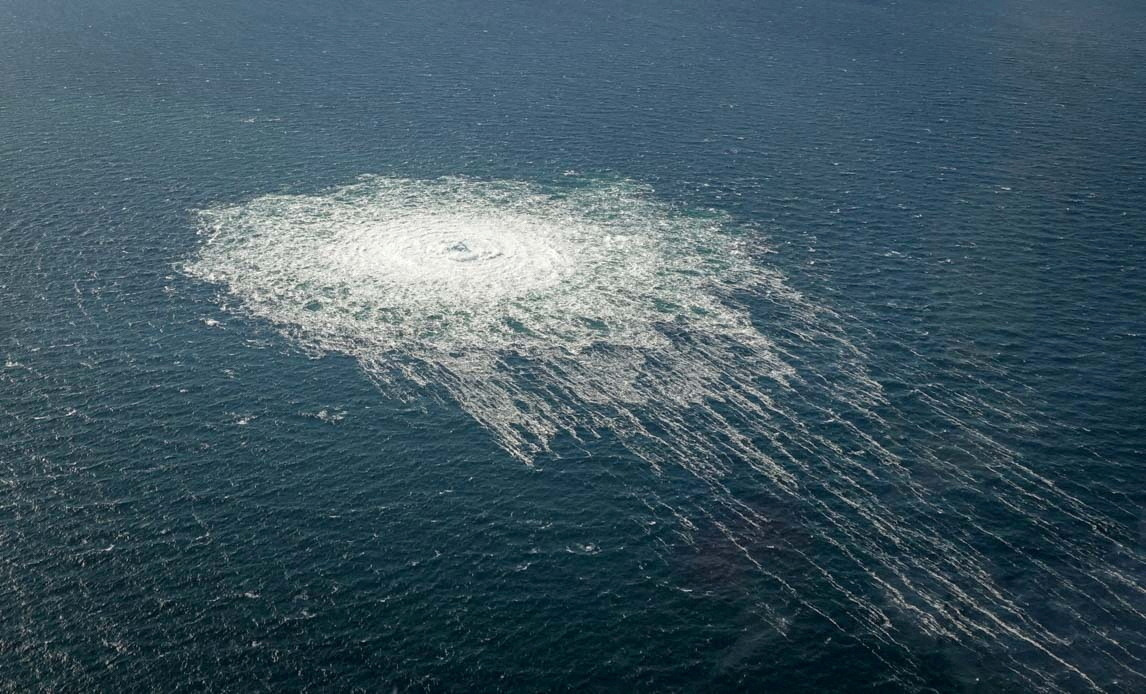Introduction
The relationship between the United States and Europe has been one of the most crucial partnerships in global affairs since the end of World War II. However, recent events surrounding the Nord Stream 2 gas pipeline have tested this relationship. In this article, we will explore the history of the relationship between the United States and Europe, the importance of Nord Stream 2, and the impact of the sabotage of the pipeline on this relationship.
History of the Relationship Between the United States and Europe
The relationship between the United States and Europe has been shaped by numerous historical events. After World War II, the United States provided significant financial aid to Western Europe through the Marshall Plan. This aid helped to rebuild Europe and prevent the spread of communism in the region. The United States also played a significant role in the formation of NATO, which has been “instrumental” in ensuring the security of Europe since its creation in 1949.
Numerous events have also tested the partnership between the United States and Europe. One of the most significant events was the 2003 invasion of Iraq. The United States’s decision to invade Iraq without the support of the United Nations was highly controversial in Europe and strained the relationship between the United States and its European allies.
The Importance of Nord Stream 2
Nord Stream 2 is a gas pipeline that runs from Russia to Germany. The pipeline is designed to increase the supply of natural gas to Europe and reduce the region’s dependence on gas from other countries. The pipeline has been highly controversial, with many European countries expressing concerns about Russia’s control of the gas supply.
The United States has been highly critical of Nord Stream 2 and has imposed sanctions on companies involved in the pipeline’s construction. The United States argues that the pipeline will increase Europe’s dependence on Russian gas and strengthen Russia’s economic and political power in the region.

it is important to fully comprehend the characteristics of this underwater pipeline. It is constructed by assembling and welding together 12-meter-long segments of steel, just over 1 meter in diameter and 4 cm thick, weighing 12 tonnes. They are very thick and sturdy to withstand the high pressures inside the pipeline. They are then covered with an 8 cm layer of concrete, also weighing 12 tonnes, to weigh them down and keep them anchored to the seabed.

As the gas pipeline is 1,220 km long, each tube consists of approximately 100,000 segments and weighs 2,400,000 tonnes. Therefore, the four Nord Stream tubes weigh nearly 10 million tonnes, including 5 million tonnes of steel. This steel mass alone represents nearly 500 times the weight of the Eiffel Tower (which weighs approximately 10,000 tonnes), over a distance equal to 4,000 times the height of the Tower.
The Impact of Sabotage on the Relationship between the United States and Europe
The sabotage of Nord Stream 2 has further strained the relationship between the United States and Europe. In December 2019, the United States imposed sanctions on companies involved in the pipeline’s construction, including companies based in Europe. In January 2021, the Trump administration imposed further sanctions on the pipeline.
The Biden administration has also been highly critical of Nord Stream 2, but it has taken a slightly different approach than the Trump administration. The Biden administration has stated that it opposes the pipeline but does not want to impose sanctions on European companies involved in its construction. Instead, the administration has proposed a diplomatic solution to the issue.
The sabotage of Nord Stream 2 has had a significant impact on the relationship between the United States and Europe. Many European countries have criticized the United States for imposing sanctions on companies involved in the pipeline’s construction, arguing that the United States is interfering in Europe’s energy policy. This has led to a further deterioration of the relationship between the United States and Europe.
Conclusion
This is the part I’m supposed to conclude but this time I am going to do something different, for now, you can call me as you want, I don’t care because I’m very mad.
Let me introduce you to Seymour Hersh

Seymour Hersh was born in Chicago in 1937. After attending the University of Chicago, he began his journalism career as a copyboy for the City News Bureau. He later worked as a police reporter for the Chicago Daily News before moving on to the Associated Press, where he covered the Vietnam War.
In 1969, Hersh began working as a freelance journalist, and it was during this time that he broke the story of the My Lai massacre, in which U.S. troops killed hundreds of Vietnamese civilians. His reporting on the incident earned him a Pulitzer Prize in 1970.
Over the years, Hersh has continued to uncover stories that have shaken the foundations of American politics and foreign policy. He has written about government secrecy, the CIA, and U.S. military interventions around the world. His reporting on the Abu Ghraib torture scandal during the Iraq War was particularly influential, leading to a national debate about U.S. policy on prisoner abuse.
Throughout his career, Hersh has faced criticism and backlash from those who disapprove of his reporting. But he has remained steadfast in his commitment to uncovering the truth and shining a light on government activities that might otherwise go unnoticed. Today, he is widely regarded as one of the most important investigative journalists of his time.
Who did that?
Hersh is an accomplished writer and journalist with a recent publication on Substack titled “How America Took Out The Nord Stream Pipeline.” The article, citing a source with direct knowledge of the operation, alleges that US Navy divers, acting on orders from the Biden administration, used remotely triggered explosives to destroy the natural gas pipeline from Russia to Germany. If true, this would constitute a significant violation of sovereignty and possibly an act of war against an ally. Furthermore, the alleged attack could result in a significant environmental catastrophe, releasing approximately 300,000 tonnes of methane into the atmosphere, possibly the largest leak in history.
Initially, the White House described the Nord Stream explosion as an act of sabotage, with Energy Secretary Jennifer Granholm suggesting that Putin was responsible. Her claim was echoed by a chorus of European leaders, intensifying the demand for further escalation in Ukraine. However, by the end of 2022, Western officials conceded that there was no evidence to support the notion that Russia had detonated its pipeline or any plausible motive for it to do so.
The Kremlin has since called for an international investigation into the alleged attack, while Washington has dismissed Hersh’s narrative as “utterly false and complete fiction.” Recently, Hersh spoke to NLR editor Alexander Zevin about the possible rationale for the Nord Stream operation, the conflict within the Biden administration over the war in Ukraine, and the current state of the American media landscape.

The Nord Stream pipeline, which is 200 feet under the ocean, is a massive and robust structure that is further fortified by a three-inch layer of cement covering. Despite its sturdiness, the pipeline has been a target of sabotage, which occurred in an area controlled by Denmark. Sabotaging the pipeline requires highly skilled divers, advanced weapons, and geopolitical connections. Given the depth and security measures surrounding the pipeline, it is evident that the saboteurs had access to advanced technology and resources. But it’s a “Pro-Ukrainian group”

So who the F* did it?
Consequences
So someone blew up the pipeline and we have to pay for it.
- Gas pipeline deliveries are currently at 15% of January levels due to multiple issues with pipelines.
- Yamal pipeline stopped gas transport in May 2022 due to Gazprom being sanctioned by Poland on April 26th.
- Brotherhood pipeline reduced deliveries to Europe due to Ukraine blocking transit on one of the branches after the Russian invasion.
- Nord Stream 1 pipeline not functioning since September due to a turbine oil leak, with disagreements between Russia and Europe on reasons for the delay.
- EU heavily stocked up on gas during the summer to prepare for the winter, but it will be more challenging to refill stocks in 2023 due to anticipated global demand exceeding supply.
- Reasons for Nord Stream 1 delay include technical and regulatory issues related to sanctions on operating materials and accusations of political pressure by Russia on Europe.
- Winter gas supply in Europe could be at risk due to decreased pipeline deliveries and anticipated high global demand.
Gas deliveries in Europe have decreased significantly due to multiple pipeline issues, including sanctions, transit blockades, and technical difficulties. While the EU has stocked up on gas for the winter, it may face challenges in refilling its reserves in 2023 as global demand is expected to surpass supply.
Europe will have to turn to Norway, which is a member of NATO but refuses to sell its gas at a moderate price, as well as Algeria and liquefied natural gas (LNG) exporting countries.
The imported gas will be very expensive, which will directly impact the budgets of European households that consume gas, as well as the public finances of countries seeking to limit price increases, such as France. Germany has just announced a €200 billion plan that has torn the EU apart. Affected countries will see their deficits substantially increase, which will have a cascading effect on the interest rates paid by the state. As a result, financing public deficits and public debt could become untenable. Furthermore, the neoliberal deregulation policies pursued over the past 15 years have led three-quarters of households to abandon regulated gas prices in favor of supposedly more attractive free-market prices – except, for example, in times of crisis.

But why?
Germany is considered the heart of the EU because of its strong and diversified economy, its central location in Europe, and its influential role in the EU’s decision-making processes. As the largest economy in the EU, Germany accounts for a significant portion of the bloc’s overall GDP and plays a crucial role in driving economic growth and stability across the region.
However, if Germany does not have access to cheaper gas from Russia, it could have severe consequences not just for Germany’s economy but for the wider EU economy as well. The high cost of imported gas would directly impact the budgets of European households that consume gas, as well as the finances of countries that seek to limit price increases. The countries affected would see their deficits increase substantially, leading to upward pressure on the interest rates paid by the state. This, in turn, could make the financing of public deficits and debt unsustainable, potentially leading to wider economic instability and a negative impact on the EU’s economy as a whole.
In 2013 the global surveillance programs used by the US government included the collection of phone records of millions of Americans and the monitoring of internet communications through programs such as PRISM, the programs also targeted foreign governments and institutions, including the European Union and nothing happened to the USA the UE did not do anything significant against the USA…
Why
It’s over.

https://seymourhersh.substack.com/p/how-america-took-out-the-nord-stream?sort=top
https://www.nord-stream.com/the-project/construction/
https://www.britannica.com/biography/Seymour-Hersh
https://www.ft.com/content/0f87e1b6-d46a-4f25-a903-eaafc092f9e7
https://www.brecorder.com/news/40230955/govt-declassifies-toshakhana-gift-records-from-2002-onwards
- Driving Innovation: How Tech Partnerships Power Formula 1 Success - 9 December 2024
- Netflix Faces Technical Knockout During Highly Anticipated Mike Tyson vs. Jake Paul Fight - 17 November 2024
- Is the U.S. in a Recession? - 1 October 2024




























